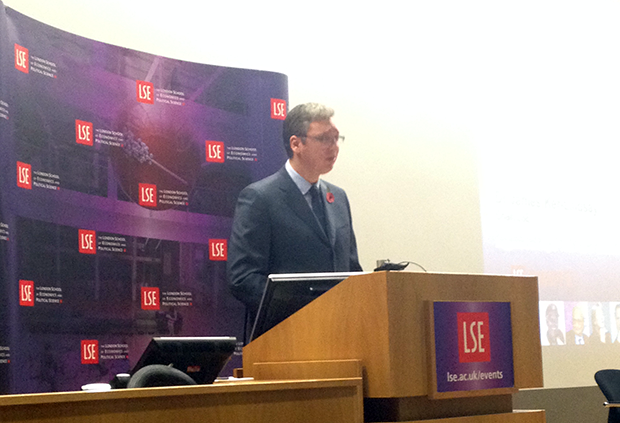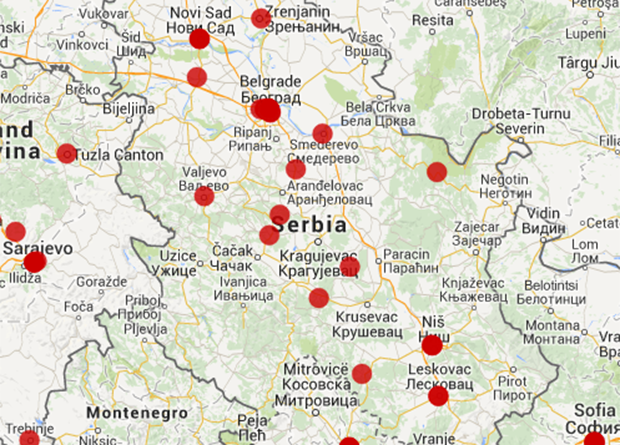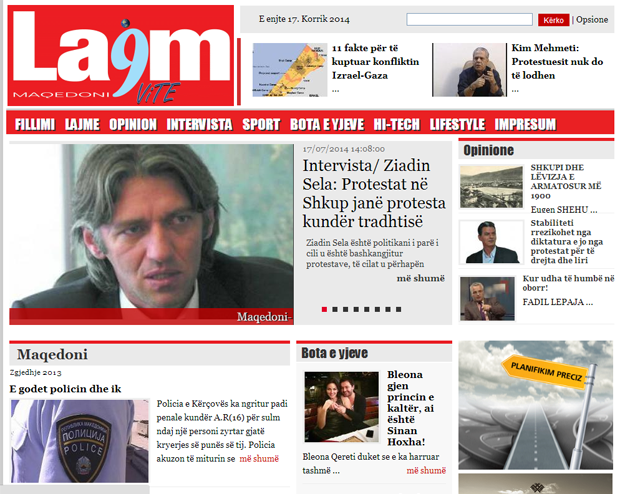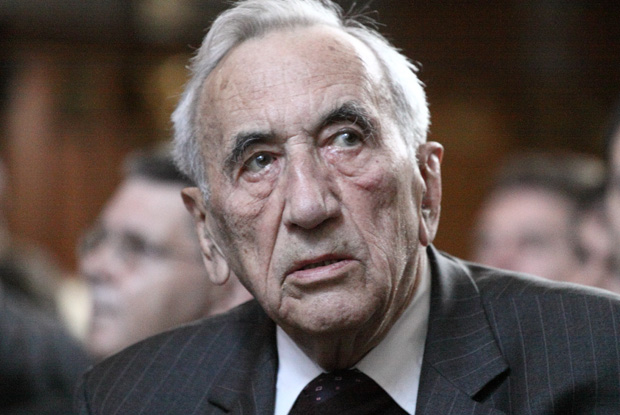29 Oct 2014 | Europe and Central Asia, News, Serbia

Serbian Prime Minister Aleksandar Vucic speaking at LSE (Photo: Milana Knezevic)
It wasn’t quite a remote controlled drone carrying a provocative political message, but Serbian Prime Minister Aleksandar Vucic’s Monday night lecture at the London School of Economics (LSE) came with its own controversial incident.
“What can you say about the total censorship of all opposition media”, Vucic was asked by a young woman in the audience just as the premier sat down for the question and answer portion of the event. She explained that she was representing Nikola Sandulovic, an opposition politician from the Serbian Republican Party, who was sitting beside her. Sandulovic said later he had travelled to London to confront Vucic.
Chaos ensued. Sandulovic claimed, among other things, that a police officer connected to Vucic had threatened to kill him and that he had evidence contained on a CD he held aloft. Vucic hit back that the Republican Party had only 0.01% of public support, and disputed Sandulovic’s assertion that he had been an adviser to former Serbian Prime Minister Zoran Djindjic, who was assassinated in 2003. Accusations flew across the room until LSE’s moderator James Ker-Lindsay finally managed regain control of the situation.
After the event, Sandulovic told Index he came to London because the media in Serbia ignore him and his party, apart from when government-friendly outlets attack him.
That press freedom was a popular topic on the night did not comes as a surprise. Serbia has seen a string of censorship incidents during Vucic’s time in power, as Index and many others have reported.
The prime minister himself brought up the press in his introductory lecture. He explained how his government has passed several new laws aimed at improving the media landscape, and complained that despite this, they are “scapegoated”. He directly addressed the recent controversial cancellation of a political talk show, Utisak Nedelje (Impressions of the Week), saying authorities have been subjected to a blame campaign for what was a commercial decision. Supporters of the show, including host Olja Beckovic, say it was down to political pressure.
In a joking reference to his infamous role under Slobodan Milosevic, he said he had been the “worst minister of information”. Curiously, he also used this former job as a counterargument to critics, arguing that his past had made it easy to blame him for any instance of censorship.
But this didn’t seem to stop the press-related questions, though none of the journalists present were chosen to ask one. Apart from the memorable Sandulovic intervention, an audience-member pointed out that Utisak Nedelje wasn’t the only show to have been taken off air in recent times.
If there was an overarching theme to the night, it was that it seemed to showcase different — some would say conflicting — sides of Vucic and his administration. He reminded the audience that Belgrade had recently organised a successful Pride parade, before adding that he didn’t want to attend. To have that choice, he argued, was a real mark of freedom.
There were, of course, questions about the football drone. While Vucic said he didn’t want to share his own views, he said UEFA (European football’s governing body) saw Serbia’s side of the story by awarding them the win, before pointing out that Serbia carries its share of the responsibility. The planned state visit from Albanian Prime Minister Edi Rama — the first in 68 years — will go ahead, he also confirmed, despite the post-drone postponement.
In response to questions about relations with Russia — just weeks after the Belgrade military parade where Vladimir Putin was the guest of honour — he said the two countries would continue to build their relationship, but that this would have no impact on Serbia’s ultimate goal of European Union accession.
Much has been made of Vucic’s apparent journey from Milosevic man to EU enthusiast. He seemed to reference this as he said he is “not perfect” and that he works “every single day” to change and better himself. But on Monday, he left more questions than answers about the direction he is taking Serbia in.
Mapping Media Violations in Europe: Serbia

Five media outlets targeted with DDoS attacks
Protesters criticise cancellation of political talk shows
Deputy mayor fined for insulting journalist
Macedonian journalist released from extradition detention
Photographer injured by anti-pride parade protesters
This article was originally posted on 29 October at indexoncensorship.org
18 Jul 2014 | Macedonia, Mapping Media Freedom, News, Politics and Society

Besim Ibrahimi, intern for the Albanian-language newspaper Lajm, was arrested on Saturday, 5 July during a rally against the jailing of alleged extremist ethnic Albanian Muslims for the “terrorist” murders of ethnic Macedonians. The journalist was accused of taking part in the violent protests, while he was covering the rally under the instructions of his editor. Ibrahimi was released on Sunday, but the prosecutor has not yet decided if he will file charges against him or not.
“The policemen from the special units approached me and forced me to lie on the ground. When I told them that I am a journalist and I am here only to cover the protests, instead of releasing me, they beat me with batons and kicked me,” Besim Ibrahimi told Index few days after his prosecution.
“One of them told me ‘you’re not a journalist, you came here to protest’ and another was shouting ‘hit him, hit him’. And they just kept beating me until my glasses broke too. When they put me inside the vehicle, along with two other guys who were also treated inhumanely, they started using some hate language like ‘I will kill you Albanians’, ‘Albanian scum’”, he continued.
Ibrahimi spent 24 hours in the police station in Kisella Voda and was released on a promise to appear in court after a decision by the Court of Skopje. According to Ibrahimi, his case is currently under investigation and he aims to present evidence in order to withdraw the claim.
The Journalists’ Association of Macedonia, ZNM, strongly condemned the arrest of the young journalist and expressed its concerns “for establishing this extremely undemocratic practice in Macedonia of arresting journalists without having hard evidences.”
As Ibrahimi explained to Index, the Macedonian government controls almost the 90% of the media and the Albanian-language newspaper Lajm is targeted by the pro-government media. “They accuse us of fueling the protests. Albanians in Macedonia are facing state discrimination.”
The recent ethnic tensions in the country were raised when life sentences were handed down to six alleged Muslim radicals for the killing of five ethnic Macedonians at Orthodox Easter in 2012.
On Friday, July 4th thousands of protesters gathered outside the criminal court building in Skopje. According to media reports, the protests turned violent with the riot police firing tear gas, stun grenades and water cannon into the crowd and some protesters throwing bricks and rocks. Six people in total were detained and 20 police officers -as well as some protesters- were injured, the police reported.
Albanians make up a quarter of the country’s 2.1 million population.
More reports from Macedonia via mediafreedom.ushahidi.com
Police pressure journalists during protests in Skopje
Telma TV under government pressure
This article was posted on July 18, 2014 at www.indexoncensorship.org
19 Jun 2014 | Azerbaijan Statements, Campaigns, Digital Freedom, Digital Freedom Statements
The following is a transcript of a joint oral statement, led by ARTICLE 19 and supported by several IFEX members, that was read aloud today, 19 June 2014, at the 26th UN Human Rights Council session in Geneva:
Thank you Mr. President,
Two years ago this Council affirmed by consensus that “the same rights that people have offline must also be protected online, in particular freedom of expression”.
In 2014, the outcome document of Net-Mundial in Brazil recognised the vital role of the internet to achieve the full realisation of sustainable development goals. 31 UN Special Rapporteurs recently affirmed that guaranteeing the free-flow of information online ensures transparency and participation in decision-making, enhancing accountability and the effectiveness of development outcomes.
Development and social inclusion relies on the internet remaining a global resource, managed in the public interest as a democratic, free and pluralistic platform. States must promote and facilitate universal, equitable, affordable and high-quality Internet access for all people on the basis of human rights and net-neutrality, including during times of unrest.
The blocking of communications, such as the shutdown of social media in Malaysia, Turkey, and Venezuela is a violation of freedom of expression and must be condemned. Dissent online must be protected. We deplore the detention of Sombat Boonngamanong in Thailand, who faces up to 14 years imprisonment for using social media to urge peaceful resistance to the recent military coup in the form of a three-finger salute.
One year after the Snowden revelations, this Council must recognise that trust in the internet is conditional on respect for the rights to freedom of expression and privacy online, regardless of users’ nationality or location. Any mass (or dragnet) surveillance, which comprises collection, processing and interception of all forms of communication, is inherently disproportionate and a violation of fundamental human rights.
The targeted interception and collection of personal data must be conducted in accordance with international human rights law, as set out in the necessary and proportionate principles. Critical and intermediate infrastructure must not be tampered with for this end, nor should any system, protocol or standard be weakened to facilitate interception or decryption of data.
ARTICLE 19 urges the Human Rights Council to take action to comprehensively address these challenges.
Thank you.
Signed,
ActiveWatch – Media Monitoring Agency
Africa Freedom of Information Centre
Albanian Media Institute
Arabic Network for Human Rights Information
ARTICLE 19
Association of Caribbean Media Workers
Bahrain Center for Human Rights
Cairo Institute for Human Rights Studies
Cambodian Center for Human Rights
Canadian Journalists for Free Expression
Center for Independent Journalism – Romania
Center for Media Freedom and Responsibility
Egyptian Organization for Human Rights
Foro de Periodismo Argentino
Foundation for Press Freedom – FLIP
Freedom Forum
Human Rights Watch
Index on Censorship
Institute for the Studies on Free Flow of Information
International Press Institute
Maharat Foundation
Media, Entertainment and Arts Alliance
Media Institute of Southern Africa
Media Rights Agenda
National Union of Somali Journalists
Norwegian PEN
Pacific Islands News Association
Pakistan Press Foundation
PEN Canada
Privacy International
Reporters Without Borders
Southeast Asian Press Alliance
South East European Network for Professionalization of Media
West African Journalists Association
World Association of Community Radio Broadcasters – AMARC
Access
Alternative Informatics
Asian Forum for Human Rights and Development (FORUM-ASIA)
Association for Progressive Communications (APC)
Bangladesh Internet Governance Forum
Bangladesh NGOs Network for Radio and Communications (BNNRC)
Barys Zvozskau Belarusian Human Rights House
Big Brother Watch
Bir Duino (Kyrgyzstan)
Bits of Freedom
Bolo Bhi Pakistan
Bytes For All
Center for e-parliament Research
Centre for Internet & Society
Center for National and International Studies, Azerbaijan
Center for the Development of Democracy and Human Rights, Russia
Chaos Computer Club
CIVICUS: World Alliance for Citizen Participation
Digital Rights Foundation, Pakistan
Electronic Privacy Information Center
English Pen
European Centre for Not-for-Profit Law (ECNL)
Helsinki Citizens’ Assembly – Vanadzor
Human Rights Monitoring Institute, Lithuania
International Centre for Not-for-Profit Law (ICNL)
International Federation for Human Rights (FIDH)
Kazakhstan International Bureau for Human Rights and Rule of Law
Kenya Human Rights Commission
Liberty
OpenMedia.org
Open Net Korea
Open Rights Group
Panos Institute West Africa
Samuelson-Glushko Canadian Internet Policy & Public Interest Clinic (CIPPIC)
Simon Davies, publisher of “Privacy Surgeon”
Thai Netizen Network
Zimbabwe Human Rights Forum
28 Oct 2013 | Magazine, News

Tadeusz Mazowiecki, Poland’s first post-Communist Prime Minister, died today. In 1995, he spoke to Index on Censorship magazine about his decision to resign as Special Rapporteur of the UN Commission on Human Rights in former Yugoslavia, in protest of the inaction of the international community in the face of the conflict
—
In 1989 Tadeusz Mazowiecki, a founding member of Solidarity, was elected the first non-Communist premier of Poland. Two years later, after resigning his premiership, he became Special Rapporteur of the United Nation’s Commission on Human Rights in former Yugoslavia. In July this year, in his letter of resignation, he said, ‘One cannot speak about the protection of human rights with credibility when one is confronted with the lack of consistency and courage displayed by the international community and its leaders. Dawid Warsawski talked to him for Index
Following your resignation in the wake of the fall of Srebrenica, you have become a symbol of resistance for critics of the UN mission in Bosnia. Are you comfortable in this role?
I don’t know if it’s possible to feel comfortable as a symbol. The response to my resignation proved that it was a necessary protest. The world had come to accept war crimes as a fact of life. But there were those who found it difficult to understand why rhetoric about human rights and morality wasn’t being reflected in political action. There was a need for some kind of gesture on their behalf.
In an open letter published in La Stampa a few days after your resignation, the Croatian writer Slavenka Drakulic, though respecting your decision, accuses you if betraying the hopes of people in former Yugoslavia who wanted you to be their voice.
I saw this as a serious problem when I was weighing up the options. But I do intend to go on speaking out, and I believe that, for these people too, it was more important to protest than to pretend that nothing had happened. For me, Srebrenica was the last straw. Once again promises had been broken and values betrayed. It is hard to be the voice of hope when one is forced into a posture of complete helplessness.
What powers did the UN mandate give you?
I had the right to analyse and report on all abuses of human rights and humanitarian law. But the recommendations I made in connection with the war touched upon issues that came under the exclusive competence of the Security Council. That was the mandate’s weakness.
Only the Human Rights Commission, which appointed me to this post, was obliged to take account of my recommendations. Extraordinary meetings apart, the Commission meets barely once a year to make a survey of the human rights situation throughout the world. There is little time for detailed examination.
The Security Council drew on my reports, but had no obligation to take account of my recommendations. In the course of my three years at the UN, I was invited to a meeting of the Security Council just once, and allowed to make a brief address. My invitation, as Human Rights Commission rapporteur, drew protest from the representatives of China and Zimbabwe. Within the UN structure, the Human Rights Commission is subordinate to the Economic and Social Council – which is far less important than the Security Council. My invitation set a bureaucratic precedent and it must have stirred anxieties. A discussion on human rights in the former Yugoslavia today could mean a debate on China tomorrow.
Did you feel that the UN was giving you firm help and support?
I didn’t; yet people I met on the ground were convinced that the UN was fully behind me and that I could do a great deal within it. This wasn’t exactly the case and made my own position more difficult.
What sort of budget and personnel did you have at your disposal?
Compared to rapporteurs in other countries I managed to secure a considerable amount. I won the right to appoint personnel on the ground, though I didn’t have any influence on their selection. We have representation in Zagreb, Sarajevo, Skopje and most recently in Mostar. But we failed to gain representation in Belgrade because of the attitude taken by the Serbian authorities. My colleagues were able to intervene over some issues (in Croatia, for example). In other cases they were unable to do so because they weren’t permitted to go in by the Serbian side in Bosnia, Croatia, Serbia itself and Montenegro.
What were the financial arrangements?
The appointment of ground personnel overstepped the normal UN budget. The costs were covered by additional funds from state sources, particularly the US government, and by private funds, especially the Soros Foundation. We didn’t know at the end of one year whether funding for the following year would be available.
How do you assess your co-operation with the Bosnian, Croat and Serb authorities on the ground?
Everyone expected me to report on crimes committed by the other sides and preferred me not to note their own human rights abuses. After two visits the Serb authorities began to register great dissatisfaction with my mission – probably because I wrote full and harsh reports about the position of Albanians in Kosovo.
In my dealings with the Bosnian Serbs there were serious problems from the start. During my first visit, when we looked at the explosive issue of the concentration camps, I went to Manjaca. There I had an extraordinary and unforgettable interview with the camp commandant. He addressed me with a mixture of flattery and threats, and the purpose of it all was to prevent me from seeing the prisoners. Later the Bosnian Serb authorities apologised. The fact that I had concluded that the Bosnian Serbs were chiefly responsible for carrying out ethnic cleansing policies must have played a part in this episode, as well as my view that their human rights abuses were the most glaring. The Croatian authorities were ‘generally co-operative’, as they say. But the military authorities did not, for example, put a stop to the expulsion of Serbian families from homes on military property, despite promises to the contrary.
The Bosnian authorities were co-operative, but at the end of my mission I discovered that in Tarcino there has for years been a camp maintained by the Bosnian authorities, with over one hundred prisoners held hostage by local people.
How useful was your own experience as a political prisoner in Communist Poland? I remember an incident in Zenica where prisoners were saying that when the commandant goes home, the guards set about ill-treating them. The commandant denied the allegations, to which you responded that you too had been a prisoner once and fully understood what it meant. His jaw dropped. I imagine he’d never met a former prisoner turned dignitary.
The experience was just as useful when I was formulating my criticisms of the London Conference. Watching its political dynamic I saw a failure to understand who we were dealing with.
For some, it was a political problem, faintly exotic and rather marginal on the world scale. They were working on it without the experience that, at times, there is nothing real about ‘realpolitik’. They showed a lack of readiness to tread the edge of the impossible in politics. In Eastern Europe we have learnt all about this, but it still doesn’t fit into the categories of Western European political thought – even despite the fall of Communism.
What were your relations with the various agencies of the UN?
There was a serious lack of co-ordination between the different agencies of the UN and others – such as the London International Conference on former Yugoslavia – of which the UN forms a significant part. I also had to get used to the fact that UN staff, especially the civilian staff of UNPROFOR were under no obligation to pass on documentation relating to human rights abuses. There was one occasion when vital information concerning a serious war crime (the mass graves at Ovcara near Vukovar) was not communicated to us. I discovered that UNPROFOR personnel had been aware of it, while I found out only at a later stage. Information as important as that should have been passed on.
In general I have the impression that UN structures are not geared to monitoring or counteracting human rights abuses. In my view the UNPROFOR mandate was essentially sick. It was assumed that it was possible to go into a war situation with a peacekeeping mandate. Moreover, the international community made a series of concessions to the Serbs; it was prepared to accept what they had done as a fait accompli. And the Serbs became increasingly less inclined to take account of the possibility that their actions might provoke a strong response. UNPROFOR came to be treated like a hostage, initially in a metaphorical sense and, later, literally. The UNPROFOR mandate was wholly inadequate in these conditions.
What preventive facilities does the UN have? It seems to act adequately In the wake of disasters, but apparently can’t do anything to prevent them.
I agree, but at present the UN has become a convenient whipping boy. Decisions are taken not by the UN but by its member states. The question is do we really want an organisation which would have greater powers? Personally, I was unable to accept the lack of will to action. The UN lacks a clear vision of itself as an organisation and the single- mindedness to realise it the one hand pledges were being made in the name of the UN and on the other the will wasn’t there to fulfil them.
Who lacks the will? Where does the blockage arise?
In my view the UN lacks a clear vision of itself as an organisation and the single-mindedness to realise it. Secondly, the states involved in decision taking have no common political will; there is a conflict of interests. It’s a problem which reaches beyond the Yugoslav conflict. What are the guidelines by which the world is to order itself following the collapse of the geo-political model drawn up at Yalta? The UN was created as an integral part of that model. Do we now want to strengthen and equip it with effective means of action? Or is it to be a political International Red Cross which, though perhaps necessary, cannot promise people any kind o f resolution?
What are your plans now?
I don’t propose to wash my hands of the former Yugoslavia . These three years have been very important to me personally. Elementary human solidarity is also a factor: it’s very hard for me to agree with the view that the Balkans are a traditionally violent region which should be left well alone. Moreover, I firmly believe that we have underestimated the consequences of this conflict and of Europe’s ineffectual response to it for the whole international order.
Dawid Warsawski is the pen name of Konstanty Gebert, a former under- ground activist and journalist involved in Jewish cultural life
Click here to subscribe to Index on Censorship magazine, or download the app here
This article was originally published in the autumn 1995 edition of Index on Censorship magazine.




